2/12/2025

AB
Best AI Data Analyst Tools for Automated Reporting in 2025
The modern AI reporting landscape offers three paths: open-source freedom (Apache Superset + PandasAI), enterprise power (ThoughtSpot, Domo, Tableau/Einstein, Sisense), and unified autonomy (Autonmis). Prioritize NLQ, anomaly detection, scheduling, integrations, and explainability to supercharge your reporting in 2025.
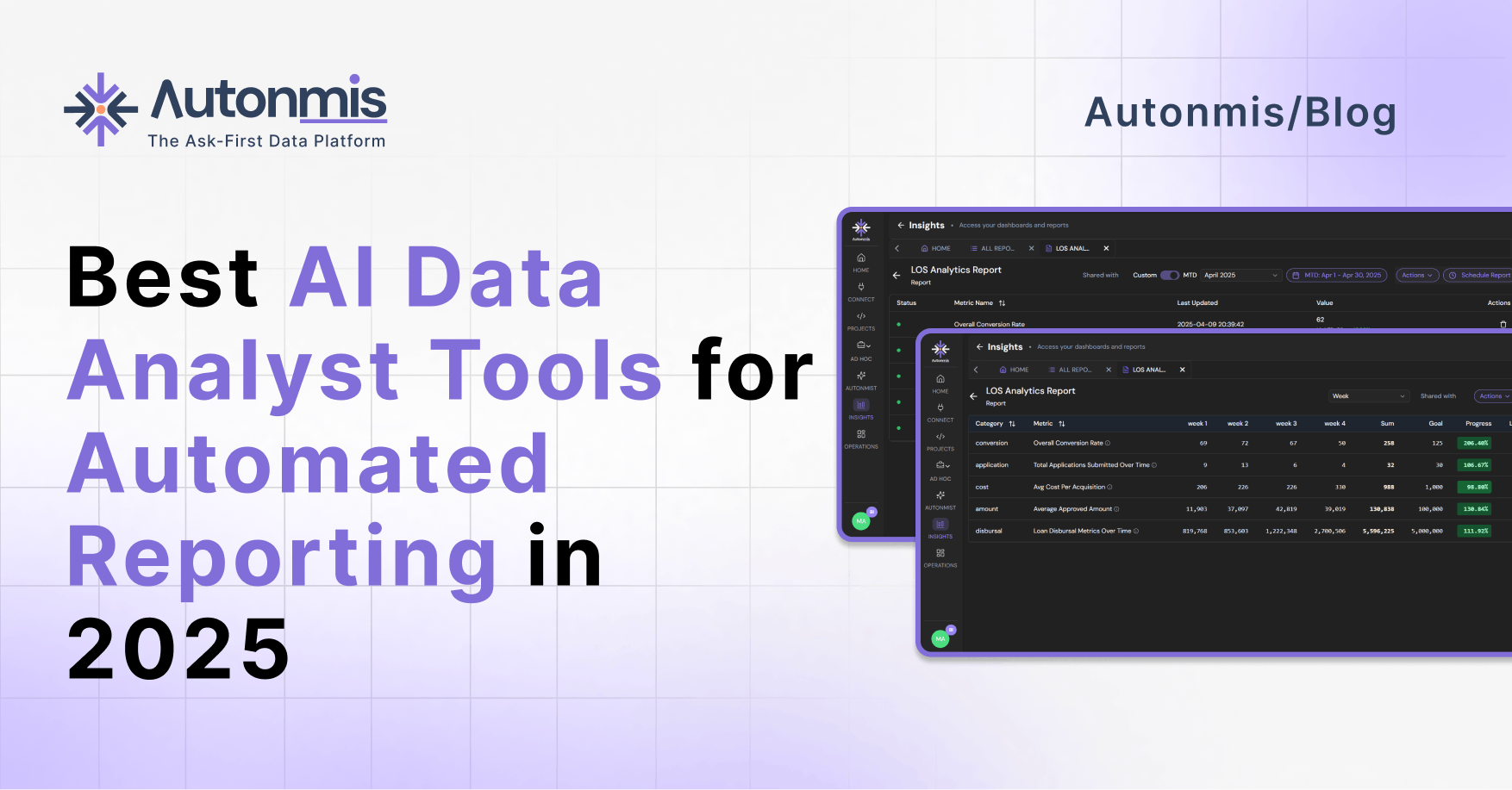
Automated reporting has evolved from a “nice-to-have” into a strategic imperative. In 2025, data teams must surface insights in real time, catch anomalies before they cascade, and deliver polished reports to stakeholders - all without manual toil. The modern reporting stack now spans three categories:
- Pure Open-Source Foundations: DIY toolkits that give you ultimate flexibility (e.g., Apache Superset + PandasAI).
- Enterprise-Grade Platforms: Battle-tested solutions with end-to-end UIs and SLAs (e.g., ThoughtSpot, Domo, Tableau/Einstein).
- Autonomous Unified Suites: All-in-one, AI-first workspaces that handle ingestion through insight delivery (e.g., Autonmis).
Below, each platform is described in narrative form with no tables in terms of its AI-powered reporting features, pricing posture, and why it deserves a spot in your 2025 toolkit.
What Makes a Great AI Reporting Tool in 2025?
Before exploring individual products, look for:
- Natural-Language Query (NLQ): Business users type questions as casually as “Show me May’s revenue by region,” and get charts or written summaries back on the spot.
- Automated Anomaly Detection: Built-in engines that flag outliers or sudden shifts and explain possible causes so you never miss a hidden trend.
- API-First Architecture & Scheduling: Full REST APIs and cron-style schedulers to embed reports in apps or auto-email executives on a cadence.
- Low-Code/No-Code Integrations: Prebuilt connectors to databases, CRMs, messaging apps, and cloud storage, minimizing reliance on engineering.
- Explainability & Human-In-the-Loop: Transparency controls to inspect AI logic, tune thresholds, and certify insights before they hit dashboards.
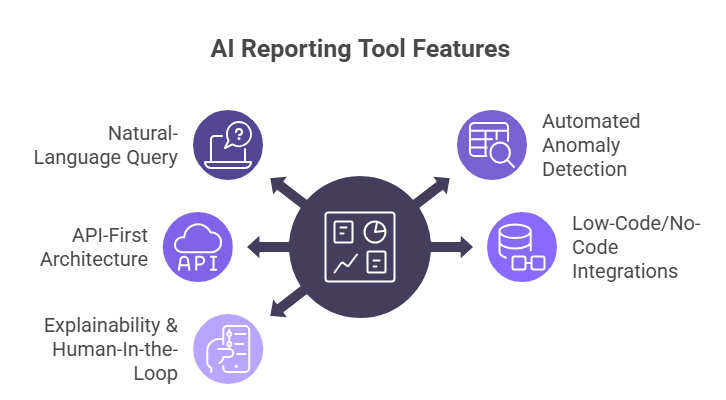
Checkout: What Is an AI Data Analyst? A Practical Guide for Modern Data Teams
Apache Superset + PandasAI (Open-Source Freedom)
Why It’s Here: For teams that refuse vendor lock-in, this combo pairs Superset’s battle-tested visual layer with PandasAI’s Jupyter-based AI copilot.
- Code-First & Notebook-Native: Write SQL or Python in the same notebook, then drop in natural-language prompts (“Summarize anomalies from April”) to get instant narrative.
- Unlimited Customization: Because you control the stack, you can integrate custom ML models, fine-tune vector indexes for semantic search, or build bespoke report templating.
- Zero Licensing Costs: Bring-your-own infrastructure means you pay only for compute and avoid the typical > $2K/month entry barrier of enterprise BI.
Use Case: A fast-moving startup embedding AI-summaries into internal docs, slashing manual slide-prep by 80%.
ThoughtSpot (Enterprise Search-Driven BI)
Why It’s Here: ThoughtSpot pioneered search-first analytics, ideal for organizations where non-technical stakeholders need self-serve reporting.
- “Spot IQ” NLQ Engine: Patented algorithms that not only parse your question but proactively surface related insights (“You asked for Q1 revenue, here’s an emerging trend in Region East”).
- Automated Root-Cause Analysis: Beyond flagging anomalies, it drills down into dimension-level causes with a single click.
- Governance & Security: Enterprise-grade role controls, data lineage, and audit logs keep IT happy.
Pricing starts north of $2 K/month, but larger firms justify it by consolidating dozens of legacy tools under one search interface.
Domo (Cloud-Native Alerts & Predictions)
Why It’s Here: Domo couples real-time data pipelines with AI-driven alerts - perfect for marketing ops and revenue teams chasing hourly metrics.
- Predictive “Domo.AI”: Forecast campaigns or sales trends and automatically generate “what-if” scenario dashboards.
- AI Chat Agent: A Slack-style assistant lets you query metrics in natural language and push results to channels or scheduled emails.
- Extensive App Ecosystem: Over 200 prebuilt connectors including social ad platforms and e-commerce carts, keep your data fresh.
Mid-market to enterprise organizations often find Domo’s $1 K–$3 K/month tiers a worthwhile trade-off for turnkey automation.
Tableau + Einstein Analytics (Salesforce-Native)
Why It’s Here: For teams heavily invested in Salesforce, adding Einstein AI to Tableau ensures your CRM data drives smarter reporting.
- “Explain Data” Suggestions: Right-click any chart to surface AI-generated insights - no notebook required.
- Einstein Discovery Embedding: Automatically build predictive models on top of your dashboards, from lead scoring to churn prediction.
- Seamless CRM Connectors: Ingest opportunities, cases, or custom objects with point-and-click simplicity.
If Salesforce underpins your business, this tandem reduces integration friction and speeds up AI adoption.
Sisense Fusion (Embedded Analytics)
Why It’s Here: Product teams looking to embed AI-powered reporting into customer-facing apps choose Sisense for its white-label capabilities.
- Fusion AI Engine: Generates narrative insights alongside charts, making complex analytics accessible to end users.
- ELT + Data Modeling: Automate data pipelines behind the scenes, so embedded reports refresh in near-real time.
- SDK & API Layer: Drop dashboards into web or mobile apps with minimal code.
Sisense’s pricing skews enterprise, but its embed focus justifies the investment for SaaS vendors seeking stickier products.
Checkout: What is Generative BI and Why It Matters in 2025?
Autonmis ( AI-Powered Data Analytics)
Why It’s Here: Autonmis unifies ingestion, transformation, analysis, and reporting in one AI-first data workspace - no stitching together five different tools.
- Visual ETL/ELT Pipelines:
Build reliable data workflows in minutes via drag-and-drop. Pipelines auto-monitor for failures and even auto-retry on error, reducing manual ops by up to 70%. - AI-Powered Notebooks & Dashboards:
A single environment where SQL, Python, and an AI Copilot coexist. Ask questions in plain English, Autonmis translates them into queries, visualizations, or narrative summaries. - Automated Reporting & Alerts:
One-click scheduling sends PDF or interactive links via email, Slack, or Teams. AI-Highlights detect anomalies and draft executive summaries, cutting prep time by 90%. - Role-Based UX:
Data Engineers: Need enterprise-grade control? Use schema explorers, versioning, and Git sync.
Analysts: Prefer drag-and-drop charts? Create dashboards with built-in quality checks and AI annotations.
Product & Leadership: Access curated self-serve portals with natural-language metric search and real-time KPI monitoring.
- Enterprise-Grade Security & Governance:
Granular RBAC, encryption at rest/in transit, and audit trails ensure compliance across industries. - Cost & Time Savings:
70% lower TCO than stacking best-of-breed tools.
37% faster insights compared to legacy BI implementations.
Real-World Impact: A supply-chain leader spotted stockout anomalies 48 hours sooner than before, and a finance team shaved 15 hours per month off compliance reportingg2.com.
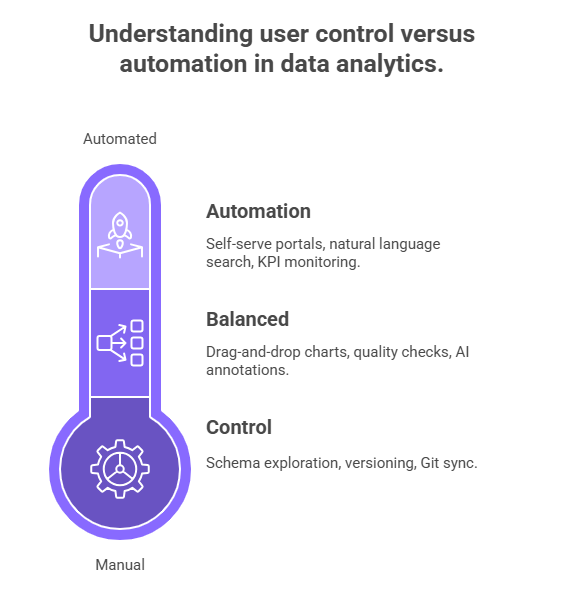
Little-Known Industry Insights
- Vector-DB Report Cache: Fewer than 1% of teams leverage vector databases (e.g., Pinecone, Weaviate) to store past report embeddings, enabling sub-second retrieval of similar analyses and slashing compute costs by up to 80%.
- Auto-TL;DR Summaries: Combining Pinecone + LangChain, you can auto-generate 3-sentence executive summaries from dashboards or PDFs via chain-of-thought prompts—cutting manual summary prep by 90%.
Quick-Start Python Snippet: DIY Automated Report
This approach combines an open-source workflow with NLQ-style prompts - no proprietary platform lock-in required.
Checkout:Top 5 Autonomous Data Platforms: Leading the Charge in 2025
Conclusion
Choosing the right AI-powered reporting tool in 2025 means balancing flexibility, automation, and ease of use. Whether you opt for an open-source combo like Apache Superset + PandasAI, an enterprise stalwart such as ThoughtSpot or Domo, a Salesforce-native solution with Tableau + Einstein, an embedded analytics platform like Sisense Fusion, or the end-to-end Autonmis suite, each brings unique strengths to the table.
By focusing on natural-language queries, automated anomaly detection, API-first scheduling, low-code integrations, and transparent AI workflows, your team can eliminate manual bottlenecks, catch critical insights early, and deliver polished reports that drive smarter decisions - faster.
Recommended Learning Articles
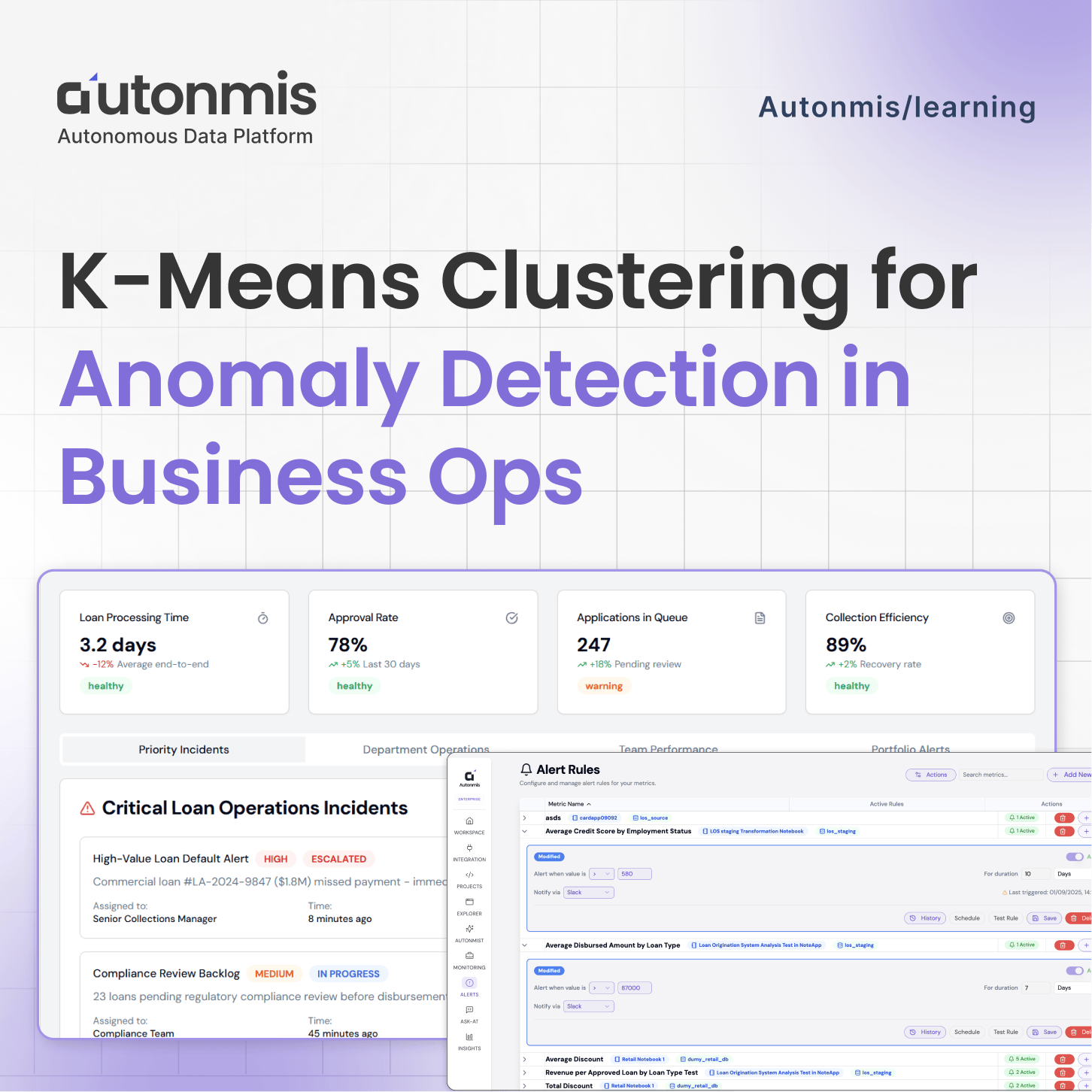
2/6/2026

AB
K-Means Clustering for Anomaly Detection in Business Operations
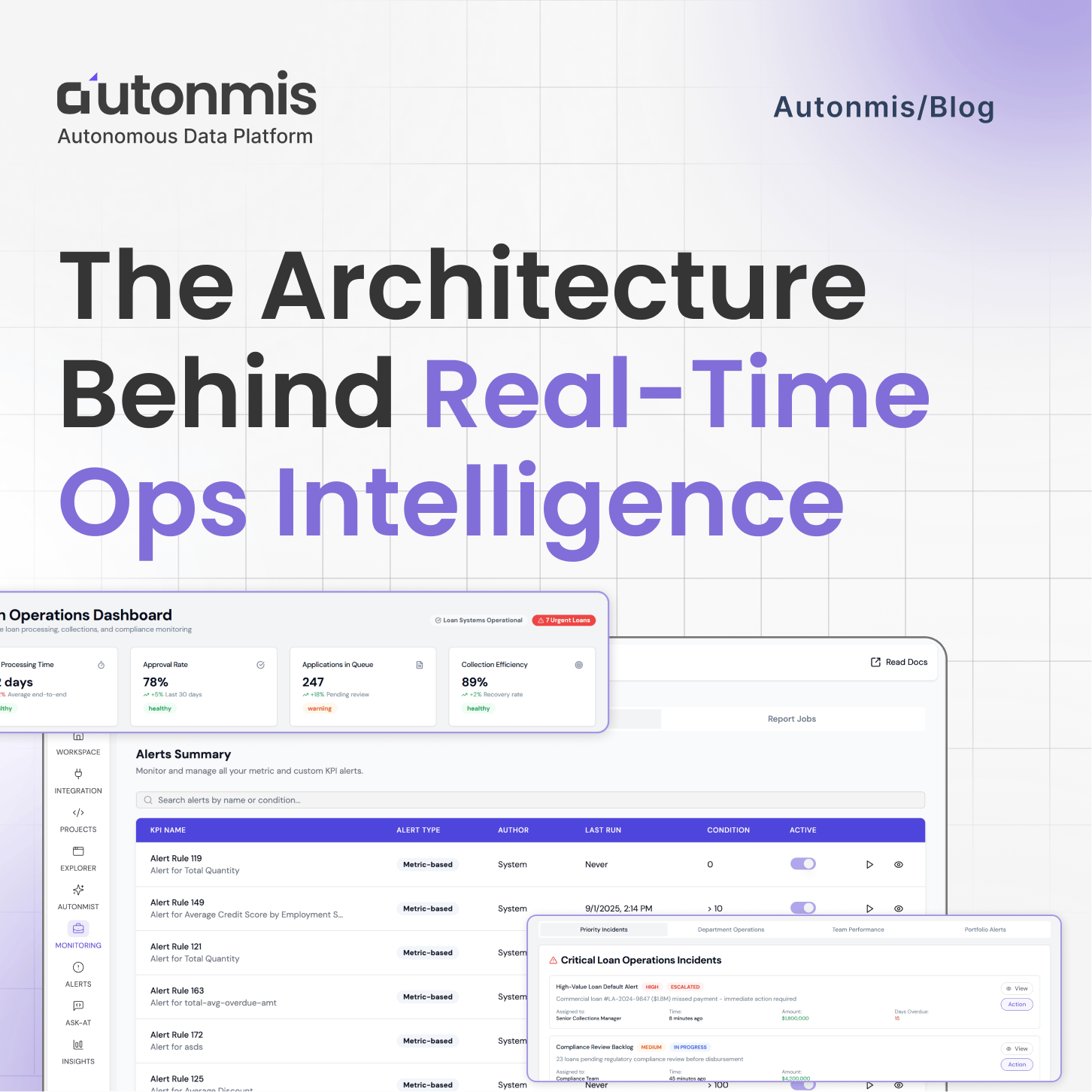
1/15/2026

AB
The Architecture Behind Real-Time Ops Intelligence: RAG + NL2SQL Explained
Actionable Operations Excellence
Autonmis helps modern teams own their entire operations and data workflow — fast, simple, and cost-effective.